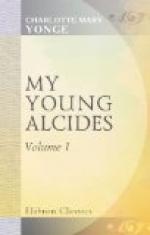“Come now, Harry,” I said, “you don’t mean that you would not have done it if you had known?”
“I should not have let the poor beast drown because his mistresses were spiteful hags.” And there was a look on his face that made me cry out in pain, “Don’t, Harry!”
“Don’t what?”
“Don’t be unforgiving. Say you forgive them.”
“I can’t. I could as soon pardon Smith.”
“But you ought to pardon both. It would be generous. It would be Christian.”
I was sorry I had said that, for he looked contemptuously and said, “So they teach you. I call it weakness.”
“Oh, Harry! dear Harry, no! The highest strength!”
“I don’t understand that kind of talk,” he said. “You don’t know what that Smith is to my poor mother!”
“We won’t talk of him; but, indeed, the Misses Stympson are grateful to you, and are sorry. Won’t you go to them on Monday?”
“No! I don’t like scandal-mongers.”
“But you have quite conquered them.”
“What do you mean? If we are the brutes they tell those who would have been our friends, we are not less so because I pulled a dog out of the river.”
The hard look was on his face, and to my faint plea, “The poor dog!”
“The dog will do very well.” He went decisively out of the way of further persuasions, and when a formal note of invitation arrived, he said Eustace and I might go, but he should not. He had something to do at the potteries; and as to the dog, the less it was meddled with the better.
“I know you hate black dogs,” said Eustace; “I only wonder you ever touched it.”
Harold’s brow lowered at this, and afterwards I asked Eustace to account for the strange dislike. He told me that the dogs at the store had run yelping after the buggy on that fatal drive, and this and the melancholy howl of the dingoes had always been supposed to be the cause of the special form of delirious fancy that had haunted Harold during the illness following—that he was pursued and dragged down by a pack of black hounds, and that the idea had so far followed him that he still had a sort of alienation from dogs, though he subdued it with a high hand.
He would still not go with us to Lake House, for go we did. An invitation was stimulating to Eustace, and though I much disliked the women, I knew we could not afford to reject an advance if we were not to continue out of humanity’s reach.
So I went, and we were made much of in spite of the disappointment.
Had not Mr. Harold Alison been so kind as to come over both Sunday and Monday morning and see to poor Nep in his kennel before they were down? Oh, yes, they had heard of it from the stable-boy, and had charged him to take care the gentleman came in to breakfast, but he could not persuade him. Such a pity he was too busy to come to-day!




